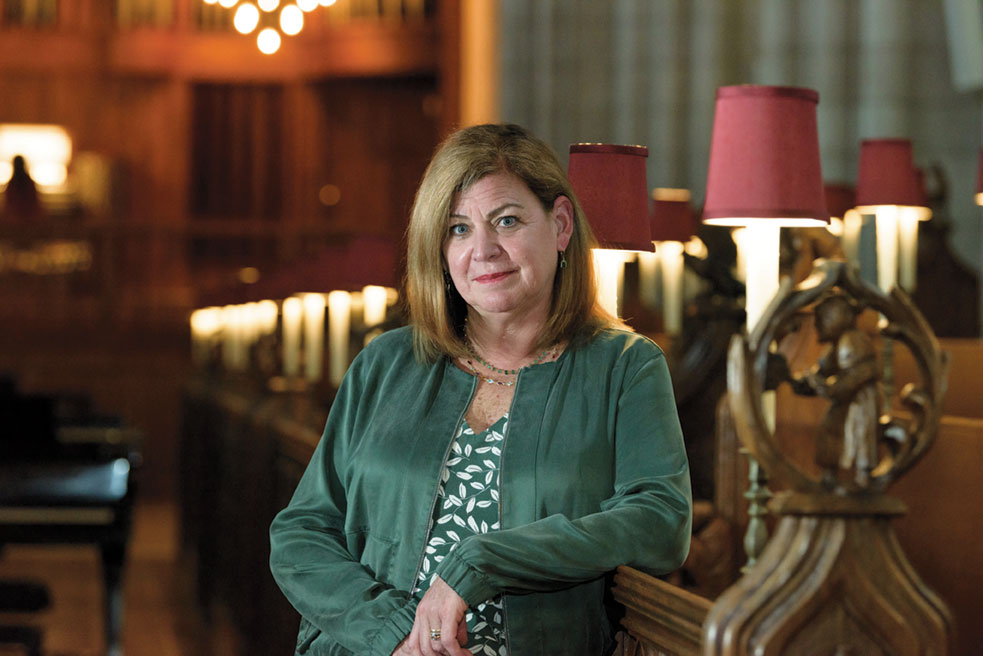Board Chair Lisa Bisaccia ’78 is listening, learning, sharing
By Kathy Andrews
Photo by Nick Caito
Lisa Bisaccia ’78 has a distinct childhood memory of riding in her parents’ car to visit her grandparents in Hartford. As she looked out the window, her attention was drawn to the sight of a big stone building with towers, all lit up. “It was up on a hill and seemed to loom over the horizon,” she says. “I asked my parents, ‘What’s that?’ ”
Upon learning, first, that it was Trinity College, and second, that a college was a school where people went to study after high school, she announced, “Oh, I would like to go there.”

Bisaccia recalls, “I remember my father saying, ‘You can’t—it’s only for boys.’ ” But in 1969, when she was in eighth grade, coeducation arrived at Trinity. A few years later, she applied to just one college—Trinity. She recalls the anticipation of walking down her driveway to the mailbox to look for an envelope from Trinity and the thrill of opening it. “I shouted, ‘Eeeeee! I made it into Trinity!’ ” Of particular significance, Bisaccia knew she would be the first woman in her family to attend a four-year college. “It was the beginning of a wonderful relationship.”
That relationship, which now spans five decades, rose to a new level in July 2021. Shortly after retiring as CVS Health’s executive vice president and chief human resources officer, Bisaccia stepped into Trinity’s top volunteer leadership role, chair of the Board of Trustees. Previously, she served on the college’s Board of Fellows and participated in Reunion planning and the Women’s Leadership Council, among other Trinity involvements.
A modern languages major at Trinity, she earned an M.B.A. at the University of Connecticut while working, first Saint Francis Hospital and then at Hartford Hospital. The M.B.A. was important for learning “the language of business,” she notes. But the skills she learned at Trinity as a humanities student are the ones she considers invaluable. “The skills of interacting successfully with people from all different backgrounds, finding things in common, being able to pick up on cues, knowing when to speak and when to hold your tongue—all of those are skills that were essential in what eventually became my chosen profession,” says Bisaccia. “I also credit Trinity with opening my eyes to the kind of career I could aspire to and preparing me for many subsequent meaningful decisions in my life.”
Today, she relishes the opportunity to serve as Trinity’s board chair and considers it an ideal way to transition into retirement. “I knew I couldn’t go from 100 miles an hour to zero,” she laughs. Bisaccia has spent much of the past year meeting with groups of Trinity alumni and other members of the Trinity community around the country and on campus. She reports that alumni tend to ask about four topic areas: 1) happenings in Hartford, 2) memories of Trinity, 3) the latest with students, faculty, and the curriculum, and 4) Trinity’s future. She notes that when alumni meet for the first time, even if they attended Trinity years apart, they dive into discussing shared Trinity experiences. “They compare notes about campus landmarks, about faculty, about events, and it’s an immediate connection across the years.”
She says she finds it rewarding to hear people’s Trinity stories and also enjoys providing updates about the college. “I share facts around our number of applicants, our increasing rates of graduation and retention, the academic profiles of the newest class, and the satisfaction of our students with the quality of their educational experience,” says Bisaccia.
As well, she focuses on what President Joanne Berger-Sweeney calls Trinity’s “spiral up” strategy. Says Bisaccia, “We are admitting wonderfully qualified applicants, who are academically prepared for the rigors of a Trinity education and also so accomplished in a whole spectrum of other dimensions—community service, the arts, athletics. I am so impressed by our students! I also talk a lot about the campaign and the strength of our endowment—it’s grown tremendously during Joanne’s tenure, but we’d all like it to be at least a billion dollars.” She points out that a substantive endowment is key to being able to make the strategic choices that are right for the college’s future.
For Bisaccia, coming to campus more often is a real plus to serving as board chair. Among her favorite spots is the Trinity College Chapel, where she sang with the Concert Choir as a student and, later, where she and her husband were married. “To be in an environment like Trinity as a young adult provided so many challenges and opportunities that have been formative to the person I have become,” she says. “I look back and think: ‘You know, if I hadn’t gone to Trinity, what might have happened?’ I know my Trinity experience is a defining variable in the choices I’ve made as an adult, even to today. I do believe I have something to give, and the something I have to give is directly connected to what Trinity gave to me, so my involvement with the college now is paying it forward in a very satisfying way.”
